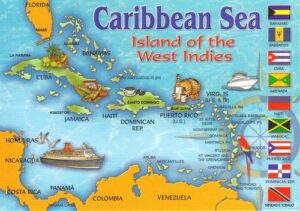The Caribbean islands are the only place on Earth that can offer you everything from beautiful beaches to scrumptious cuisines, as well as a rich history and friendly people. It has always been a popular tourist destination. Because of its stunning terrain and family-friendly culture, the Caribbean is one of the safest holiday destinations for millions of American travelers each year.
However, just like anywhere else on the planet, some travelers experience travel issues from time to time. The bulk of the time, these travel troubles are the result of tourists’ lack of preparedness. As a result, planning is essential for a successful Caribbean vacation, from obtaining a passport and finding the ideal resort to discovering important details about your destination and knowing how to pack.
Here are some travel ideas to consider while organizing your Caribbean holiday to ensure that it is a success:
- Passports should be obtained as soon as feasible. Because most Caribbean countries require passports for flying travel, every member of your family must apply. Because you don’t want to miss your holiday because your passports haven’t arrived, do this step before planning the rest of your trip.
- Before you travel, do some study. Try to learn about the culture of your destination as well as the places of interest. Check out the feedback for hotels, restaurants, and activities. You’ll be able to make more educated selections about resorts and activities once you’ve learned more about your Caribbean location. A great source of information about your destination is the Pulse of the Caribbean Travel page, which connects you directly with your destination’s travel authority/ tourism board. You can also learn about COVID-19 protocols for your destination.
- Try to involve your children in the planning process because the Caribbean has so many great family activities. Your kids will be delighted to know that they played a part in your family vacation, and you won’t have to worry about disappointments.
- Make an effort to book a resort that is close to your points of interest and offers useful amenities. Throughout the Caribbean, reputable resorts usually offer shuttle service, activity packages, and even exclusive opportunities for guests. Use the local connections given by your resort as well. Your resort can arrange everything from vehicle rentals to scuba diving excursions.
- If you plan to visit the Caribbean during the busy times (December to mid-April), make your hotel bookings at least 2-3 months in advance. During the off-season, reservations at large resorts are easier to come by and less expensive (June to November).
- You may not need to change currency depending on where you plan to vacation in the Caribbean because many islands accept both US and local currencies. However, it is generally preferable to carry the official currency of your destination, particularly when traveling outside of tourist areas. If you are unsure whether you need to change money, speak with the concierge at your resort. Your concierge can also point you in the direction of a reputable transaction.
- Food and drinking water are typically safe for the entire family throughout the Caribbean. However, if you want to spend time exploring outside of the big tourist destinations, such as the unusual desert coast of Western Aruba, bring some bottled water with you.
- Apply sunscreen to your skin. Overexposure to sunshine is by far the most prevalent health issue for Caribbean vacationers. This hazard, however, is also the easiest to avoid. Simply bring some excellent sunscreen and cover-up gear for the beach or when playing outside.
- If you encounter any problems while on vacation in the Caribbean, contact the US Embassy or Consulate. Almost all of the islands in the region have an office with useful travel information and staff who can help with many typical travel problems.
- The United States State Department also provides thorough Consular Information Sheets for all Caribbean countries. These packets of information can assist you in understanding entrance and departure regulations, currency conversion, the locations of consulates and embassies around the area, and a variety of other local concerns. Use the US State Department’s information in combination with your travel guides to plan your holiday and minimize the unnecessary stress that comes with foreign travel.
- Look into travel insurance packages before you finalize your travel plans. Travel insurance may protect you (and your money) if you have to cancel your vacation, experience delays while traveling, or experience medical issues. Before you go, see if any of these conditions are covered by your current homeowner’s and medical insurance policy.
Following these easy guidelines as you plan your Caribbean vacation will not only help you avoid typical travel problems, but will also ensure you and your family have a wonderful holiday.














